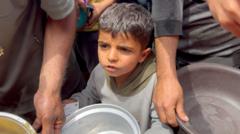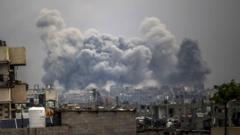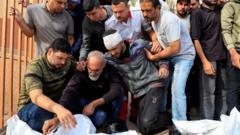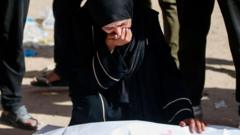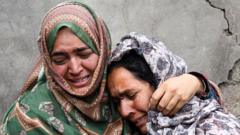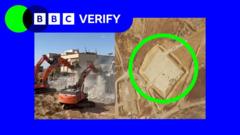As Israel intensifies its military operations in Gaza, displacing residents has fueled growing despondency among Palestinians, many of whom have faced repeated upheavals since the conflict's resurgence.
Rising Despair in Gaza Amid Israeli Displacement Plans

Rising Despair in Gaza Amid Israeli Displacement Plans
Israel’s latest strategy to expand territorial control and relocate Gazan civilians exacerbates the existing humanitarian crisis, drawing mixed responses from conflict stakeholders.
In a recent statement, the Israeli government disclosed plans to extend military action in northern Gaza, compelling thousands more to evacuate. Displaced persons like Anees Jneed, who has faced multiple relocations during the ongoing conflict, expressed hopelessness regarding further dislocation. “Displacement means death, humiliation, homelessness,” Jneed lamented as he sheltered in makeshift accommodations. The United Nations has raised alarms about the deteriorating humanitarian landscape in Gaza, revealing soaring hunger levels linked to the blockade imposed by Israel since March.
The Israeli authorities have mobilized tens of thousands of military reservists to reinforce their campaign against Hamas, viewing these actions as a means to induce negotiations regarding hostages held by the group and to pursue a cease-fire. However, the announcement was met with resistance; a Hamas spokesperson declared their withdrawal from cease-fire discussions in light of the escalating Israeli measures. The complexity of the situation reflects divergent perceptions on both sides, reinforcing the enduring cycle of violence and negotiation impasses that characterize the Israeli-Palestinian conflict. The absence of resolved dialogue threatens to magnify the humanitarian toll on civilians caught in the crossfire, underscoring the need for urgent intervention from international stakeholders.
The Israeli authorities have mobilized tens of thousands of military reservists to reinforce their campaign against Hamas, viewing these actions as a means to induce negotiations regarding hostages held by the group and to pursue a cease-fire. However, the announcement was met with resistance; a Hamas spokesperson declared their withdrawal from cease-fire discussions in light of the escalating Israeli measures. The complexity of the situation reflects divergent perceptions on both sides, reinforcing the enduring cycle of violence and negotiation impasses that characterize the Israeli-Palestinian conflict. The absence of resolved dialogue threatens to magnify the humanitarian toll on civilians caught in the crossfire, underscoring the need for urgent intervention from international stakeholders.

